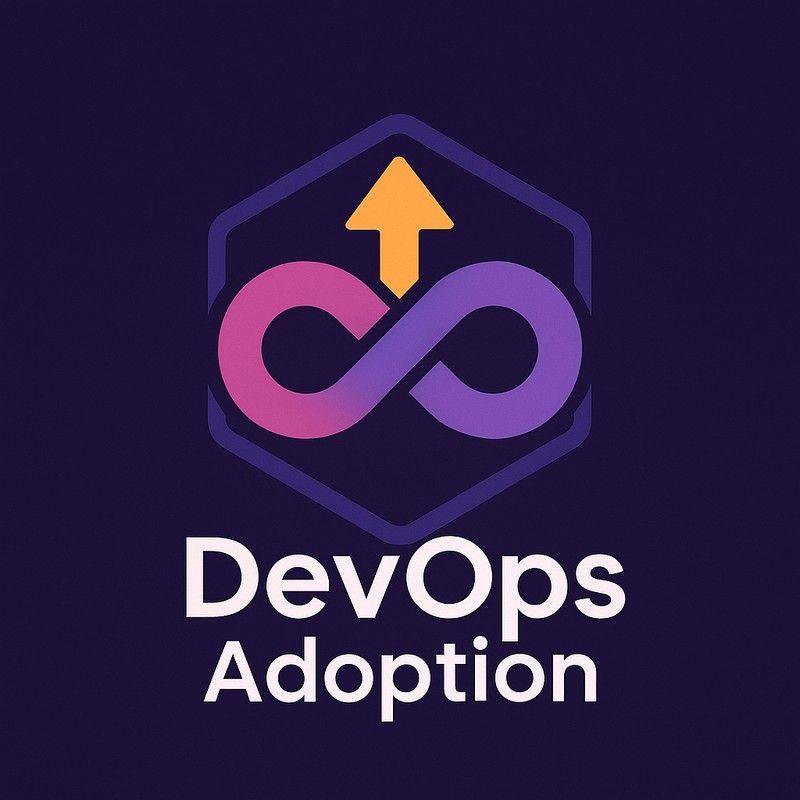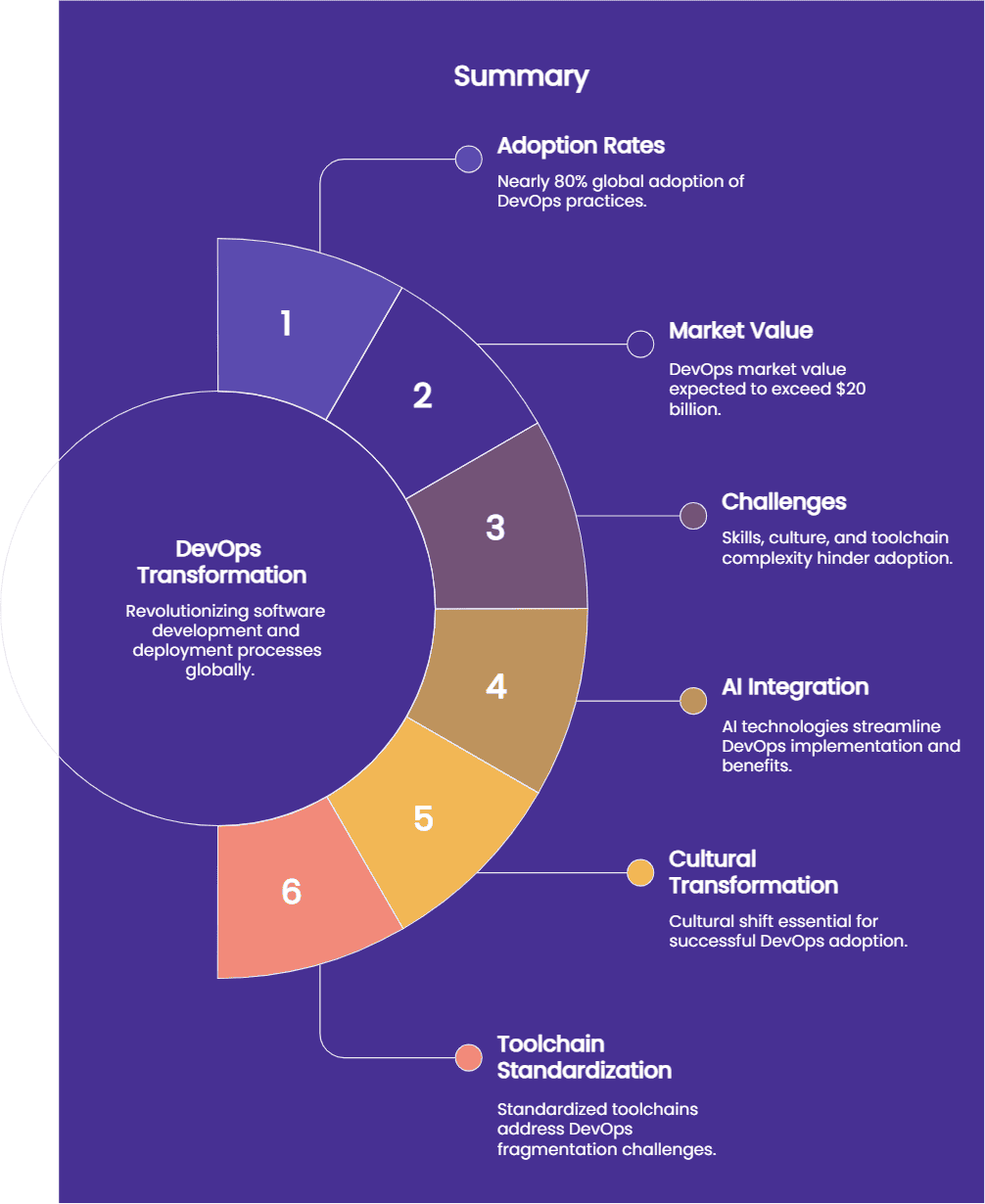- devops
- statistic
DevOps Statistics and Adoption: A Comprehensive Analysis for 2025
May 29, 2025
-
Damian Szewczyk
-
6 minutes

DevOps adoption is rapidly transforming how organizations develop and deploy software. By 2025, over 78% of organizations globally have implemented DevOps practices, reflecting its growing importance in modern software development workflows. This comprehensive analysis examines current adoption rates, key trends, implementation challenges, and future predictions for DevOps methodologies.
DevOps implementation varies significantly across sectors, with technology and finance leading the integration of these practices. Fortune 500 companies show approximately 90% DevOps adoption rates, leveraging these methodologies to enhance operational efficiency and software delivery processes. The adoption curve demonstrates exponential growth over recent years.
Industries embracing DevOps most aggressively include:
Technology sector implements DevOps to manage complex cloud-native applications and optimize CI/CD pipelines
Financial institutions utilize DevOps for secure and compliant software delivery
Healthcare organizations apply DevOps for rapid innovation in patient management systems
This cross-industry adoption highlights DevOps versatility in addressing unique business challenges while delivering consistent benefits in deployment frequency and recovery efficiency.
Reports confirm that teams implementing DevOps practices experience 46 times more frequent code deployments and 96 times faster recovery from failures compared to low-performing teams. These statistics demonstrate DevOps' transformative impact on software development lifecycles and operational resilience.
The DevOps market continues its upward trajectory, with projections indicating it will surpass $20 billion by 2026. This growth stems from increasing demand for automation, cloud computing, and containerization technologies that streamline development workflows.
Several factors drive market expansion:
Cloud computing enables scalable infrastructure and seamless deployment processes
Containerization tools like Docker and Kubernetes streamline workflows
AI-powered tools integrate into CI/CD pipelines to predict failures and optimize deployments
Platform engineering emerges as a natural evolution of traditional DevOps roles. Organizations increasingly adopt Internal Developer Platforms (IDPs) to simplify workflows and improve developer productivity. Additionally, the convergence of DevOps with MLOps (Machine Learning Operations) gains traction as companies deploy AI models alongside traditional software applications.
DevOps adopters engage in activities that enhance collaboration, automation, and continuous delivery. Key practices include:
Continuous Integration (CI): Developers frequently merge code changes into shared repositories, triggering automated builds and tests
Continuous Delivery (CD): Automated pipelines deploy code changes to production environments, reducing manual errors
Infrastructure as Code (IaC): Tools like Terraform enable teams to manage infrastructure programmatically
Automated Testing: Comprehensive test suites maintain software reliability
Nearly 85% of organizations have adopted automated testing to improve software quality, while 80% implement continuous integration as standard practice. However, only about 30% have fully integrated DevSecOps practices, indicating significant growth opportunity in security-focused automation.

Organizations implementing DevOps methodologies experience substantial improvements in software delivery, team collaboration, and overall productivity. DevOps accelerates time to market by streamlining workflows through automation and CI/CD pipelines. Companies report up to 50% faster deployment cycles, enabling quicker responses to customer demands and market changes.
DevOps delivers measurable benefits including:
Reduced lead time for changes (up to 90% improvement)
Higher deployment frequency (up to 46 times more frequent)
Faster recovery from failures (96 times quicker)
These metrics highlight the operational efficiency gained through proper DevOps implementation and maturity.
Despite its advantages, companies face several obstacles when adopting DevOps methodologies. The skills gap represents one of the most significant hurdles, with over 40% of organizations citing lack of skilled personnel as a barrier to full adoption.
Other key challenges include:
Cultural resistance impedes transition from traditional siloed workflows to collaborative environments
Technical complexities arise when managing infrastructure at scale
Legacy system integration creates compatibility issues with modern DevOps tools
Security implementation proves difficult, with only 30% of companies successfully embedding security checks into automated workflows
Overcoming these challenges typically requires investment in training programs, leadership buy-in, and scalable tools that simplify workflows while addressing security concerns.
The demand for DevOps engineers remains strong in 2025, driven by organizational needs for automation, cloud-native solutions, and scalable infrastructure management. Most positions require three to five years of experience, emphasizing hands-on knowledge in:
Kubernetes and container orchestration
Infrastructure as Code tools like Terraform
CI/CD tools including GitHub Actions and Jenkins
Cloud platforms such as AWS and Azure
Certifications including Certified Kubernetes Administrator (CKA) and HashiCorp Terraform Associate provide valuable validation of technical expertise. While senior-level positions remain abundant, entry-level opportunities face limitations due to companies prioritizing experienced candidates to reduce training costs.
DevOps implementation often suffers from fragmentation due to toolchain complexity. Organizations typically juggle multiple tools like Jenkins, Terraform, Kubernetes, and GitHub Actions, creating inefficiencies rather than streamlining processes.
@Internal Links
Professional burnout represents another significant issue. Engineers face constant pressure to:
Stay updated on emerging technologies
Manage complex pipelines
Patch security vulnerabilities
Handle on-call duties for unexpected failures
This perpetual workload contributes to high stress levels and turnover rates. Additionally, automation sometimes introduces new complexities instead of simplifying workflows, with issues like Terraform state file corruption creating significant operational challenges.
DevOps adoption is projected to exceed 80% globally by 2025, with emerging technologies reshaping implementation strategies. AI-driven automation will redefine workflows, enabling predictive analytics for system monitoring, automated troubleshooting, and capacity optimization.
Key trends shaping the future include:
GitOps emphasizes declarative configurations and automated deployments
Platform engineering gains momentum as companies adopt Internal Developer Platforms
Serverless computing becomes mainstream due to scalability and cost efficiency
MLOps integration expands DevOps scope to support AI model lifecycles
Standardization across toolchains will reduce fragmentation in DevOps ecosystems, with tools like Terraform dominating Infrastructure as Code implementations and GitHub Actions maintaining popularity for CI/CD pipelines.
DevOps continues transforming how organizations develop, deploy, and maintain software systems. With adoption rates approaching 80% globally and market value projected to exceed $20 billion by 2026, DevOps practices have become essential for competitive advantage in the digital landscape. While challenges persist in skills development, cultural adaptation, and toolchain complexity, emerging technologies like AI and platform engineering offer promising solutions to streamline implementation and maximize benefits.
For organizations considering DevOps adoption or seeking to mature existing practices, focusing on cultural transformation alongside technical implementation provides the strongest foundation for success. As the discipline evolves, integration with AI capabilities and standardization of toolchains will likely address current fragmentation challenges while expanding DevOps' scope and impact across industries.


What if deployment didn’t have to be risky? Discover how early deployment and testing let teams deliver faster, safer, and with greater confidence.

Why exactly do startups need DevOps, and when is the right time to implement it? The answers you've been searching for start here.

Deploy smart, not stressed. Are Friday releases a real risk or just a myth? Let’s find out.